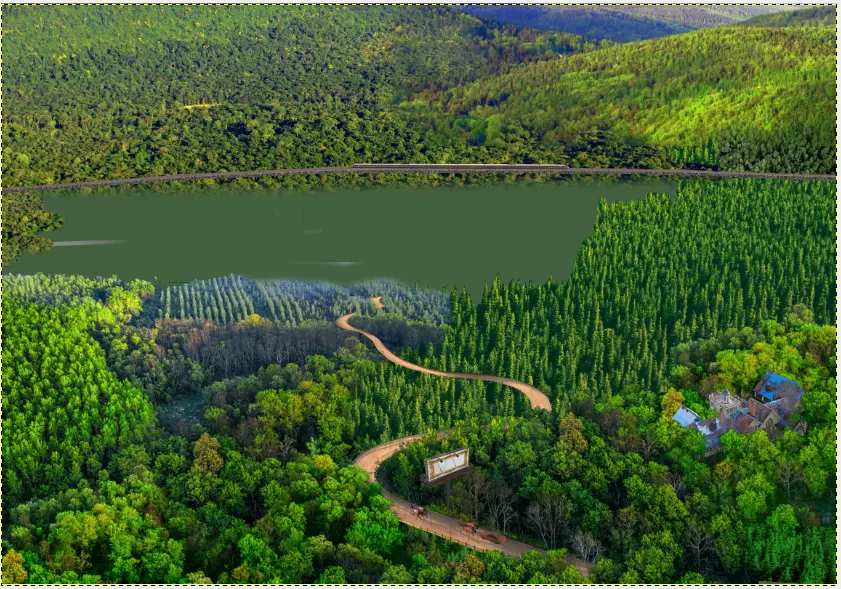Hi, recently I’ve been making these pictures/photobashes of different places in a solarpunk world, trying to demonstrate technologies or other possibilities, or values like reuse that I consider to be solarpunk. I’m working on some cityscapes but I’ve been thinking a lot about rural places since that’s where I’m from, and how they might change with some of the societal crumbles and contractions I feel like are impending. In my grandparents’ time, the region where I grew up was lots of small villages, usually bunched up around water and local industry, with farms spread out beyond that. With cars, people have spread out in these sprawling bedroom communities that are becoming ever more dense with people. Gas and groceries were 40 minutes away by car, and I feel like most people I knew drove an hour each way for work.
I wanted to do a scene sort of showing how things might change in rural areas if cars became impractical (due to shortages etc) and how things could be rebuilt better. I have a sense of what I want to include:
- Dense village surrounded by farms and forest, an abandoned mcmansion or large house far enough out to be impractical
- High speed rail access to the village
- Solar panels
- Waterwheels
- Farms
- Algae farming
For the farms, I could drop in bits and pieces of photos of farmland and make it work, I worked on a farm for a few years and feel comfortable enough for that. But I suspect folks who know more about farming, and especially folks who are into solarpunk visions of the future, might have stronger opinions on how it should be done, so I figure now is a good time to ask. What would you like to see? What should be done differently than we do now? Anything from layouts to the size of fields, to specific crops would be useful.
Edit: this’ll be in North America, by the way. (Probably northern US States though I haven’t picked one) The surrounding trees, general style of mountain, and the buildings will be based on that assumption anyways.
edit 2: here’s the current rough draft to give you an iea of the space I’m planning around
Thanks!



You mentioned working based vs military based in animal training. That’s what I’m referring to. Could you explain what it is and why it’s bad?
Especially about training of equines, mainly horses. A lot of the English and German riding tradition and a lot of equine sports derive from military tradition. The military used to be one of the main ‘employer’ of horses, starting with antique nobility, and the way they handled the animals was what ended up being the mainstream and academic source of knowledge at least in those countries - half-knowledge, because most of the actual horses’ life wasn’t spent anywhere near the wealthy noblemen who wrote clever books about how to train them. Military stuff is based on hierarchy and pain, plus, horses are not kept according to their nature to move freely in a herd, but separate from each other tied in bays or locked in boxes. Training is very much based on strict obedience, less on the horse thinking independently. It’s completely normalized to use mouthpieces and horseshoes and all sort of awful engineering to force the horse into unnatural positions and force unnatural duration and intensity of work.
Working equines might be trained roughly as well, but will often be more of an independent working partner, some may be able to socialize more freely with other equines, some may negotiate their daily duties with their owners. I’ve looked at quite a few videos of equines working in poor countries to figure out how I’d work my donkey - what’s the simplest working gear and how to use it. There’s quite a few animals that are underfed and overloaded, but more often than not you find pictures of them well treated and pulling a cart without headgear or other means of control - they are just doing their daily job and know what they are doing.
When I first saw it on video I was surprised, but then I also see it every time I spend time with my equines - I haven’t worked with them much (yet) but interactions with them are so civilized and they pick up things so quickly and do them happily for a snack, and they are also so polite and patient (after having learned they may only kick each other), it’s unfair to think of them as dumb beast without language and treat them like a sports equipment or a decoration. I’m only surprised not more people get injured in sports stables and such places. I have three: one horse and two donkeys. The horse has patiently suffered me being an idiot for 20 years and finally got me to understand her a little better and write these lines.
Woah, I had no idea. The nobility can be such dumbasses.